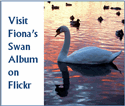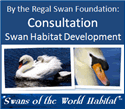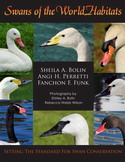Ask the Swan Specialist
Date: 1 June 2013
Hi Phil & Barbara:
Yes, this is a world-wide problem when purist biologist and others think they know why something is disappearing, but really have no clue or do not wish to address the real cause and will blame it on the most obvious culprit, any species of animal or bird in visible sight.
In the U.S., Mute Swans are believed to be non-native species (non-migratory) although if anyone thinks that nothing can migrate during global wind patterns, etc., are not dealing with a full sense of understanding of migratory patterns. There has also been studies indicating that the swans are migratory and that they are not solely responsible for the eating of the seagrasses. In some states, the solution has been to remove (cull) the mute swan (weighing 30 lbs) because it eats too much grass and is displacing the native species Trumpeter Swans (weighing 40 lbs). The theory is that a 30 lb bird is displacing a 40 lb bird. If the theory, which is readily held, that the Mute Swan is eating way too much grass, then logically thinking, how much is a 40 lb Trumpeter going to eat in that same area. Again, logical thinking does not prevail, especially if a local or federal government can make money off a species. If it can be hunted, removed, etc., and a permit which someone pays to the government can be used for fund-raising then the species can be culled or hunted.
Now, let us consider the case of your Black Swans which are native to the Australian area. First, it is a 10-14 lb bird. Unlike the Mute/Trumpeter Swans which have approximately necks of approximately 2 feet in length and can reach large depths, the black swan has an approximate foot long neck. So, even turned up upside down to feed, the bird is only going to be able to reach seagrasses within 1-5 feet from the bank (depending on shallowness) to do too much damage. If the body of water is very shallow, then yes they can reach the grasses and even pull it from the shallows. However, if the body of water has a large drop off in depth, then the swans are only going to be able to possibly reach the tip of the grasses (if at all possible) and will not be able to pull the reeds or grasses from the pond.
Think of pulling weeds or grasses in your yard. If you grab a weed or grass by the tip, you get a handful of weed or grass, but you do not really destroy the plant because it is still rooted in the soil. Now, if you can reach down at the soil level and pull the grass or weed, then the whole or at least most of the plant is uprooted. Just as in weeds, you may or may not get the whole plant and seeds drop or parts of the plant may still be under the soil and can continue to regrow. It just takes longer to reach the size of the plant if there is a constant pulling or agitation of the plant.
This is the process with the swans. They may or may not be able to get the whole plant and/or they may or may not constantly agitate the area of the grasses and weeds. We had a situation in a swan area in which the state wanted to rebuild grasses but kept blaming the dissipation of the grasses to the swans. So, state environmental representatives placed fencing around the area of new grasses so the swans could not enter or exit due to the lack of take-off area required for flying. The grasses were not taking root and the state still wanted to blame the swans. However, when it was pointed out to them that the swans were not in the area of the fenced grasses due to the inability to get into the area, and only ducks, small wading birds, etc., were in the grasses, nothing was said. But, most importantly, the GRASSES WERE NOT BEING accessed by swans and they were still not growing or multiplying in the way that they should.
Which now brings up another point. Many of these areas in which grasses are being diminished and blamed on swans are actually the result of run-off from animal farms or other pollutants that are placing an enormous amount of nitrates or other chemicals in the bodies of water. There are studies that have shown that pollutant run-off can be a reason that sea or water grasses are being diminished. Are there any animal farms or other chemical run-offs in the harbour such as boat oils, gasoline, sewage, etc.? A study needs to be conducted to see if these are not the primary causes.
Our point can be further made by going onto the New Zealand Fish & Game website regarding licenses. The game birds listed include the Black Swan, so there is money to be made to hunt these birds. The website also speaks about the kill-off of many swans during the 70's due to a run-off of silt which killed many grasses in which the swans depended upon food. So, both of these facts are stated on the NZ Fish and Game website, which should help you further your case. If the silt was the main reason for the kill-off, how can they be blaming it solely on the Black Swan when their website states that the lack of grasses resulted in the deaths of Black Swans in many of the areas. Due to the silt issue, many of these grassy areas have still not recovered and the Black Swan has also been mitigated in these areas.
Finally, what other birds does New Zealand have that can run into airplanes: geese, ducks of all kinds including shovelers, swans, etc. So, should New Zealand kill off all their birds because they may fly into an airplane? If so, then all birds around the world should be killed for this possibility as there have been instances of crows, geese and ducks also flying into planes. Of course, this would be an absurd resolution, but no more than blaming a specific species of an animal or bird for the disappearance of aquatic vegetation and not also blaming humans and their responsibility in pollutants and run-offs. Also, DO NOT just blame New Zealand for this issue as there are many other countries who can equally share the blame for these same illogical ideas on waterfowl/swan management. We hope this information is of benefit to you. The Regal Swan
Messages In This Thread
- Black swan cull in Tauranga Harbour -- Phil & Barbara -- 31 May 2013
- Re: Black swan cull in Tauranga Harbour -- The Regal Swan -- 1 June 2013
Ask the Swan Specialist is powered by
Tetra-WebBBS 5.30 Beta © 2006-2007 Tetra-Team






